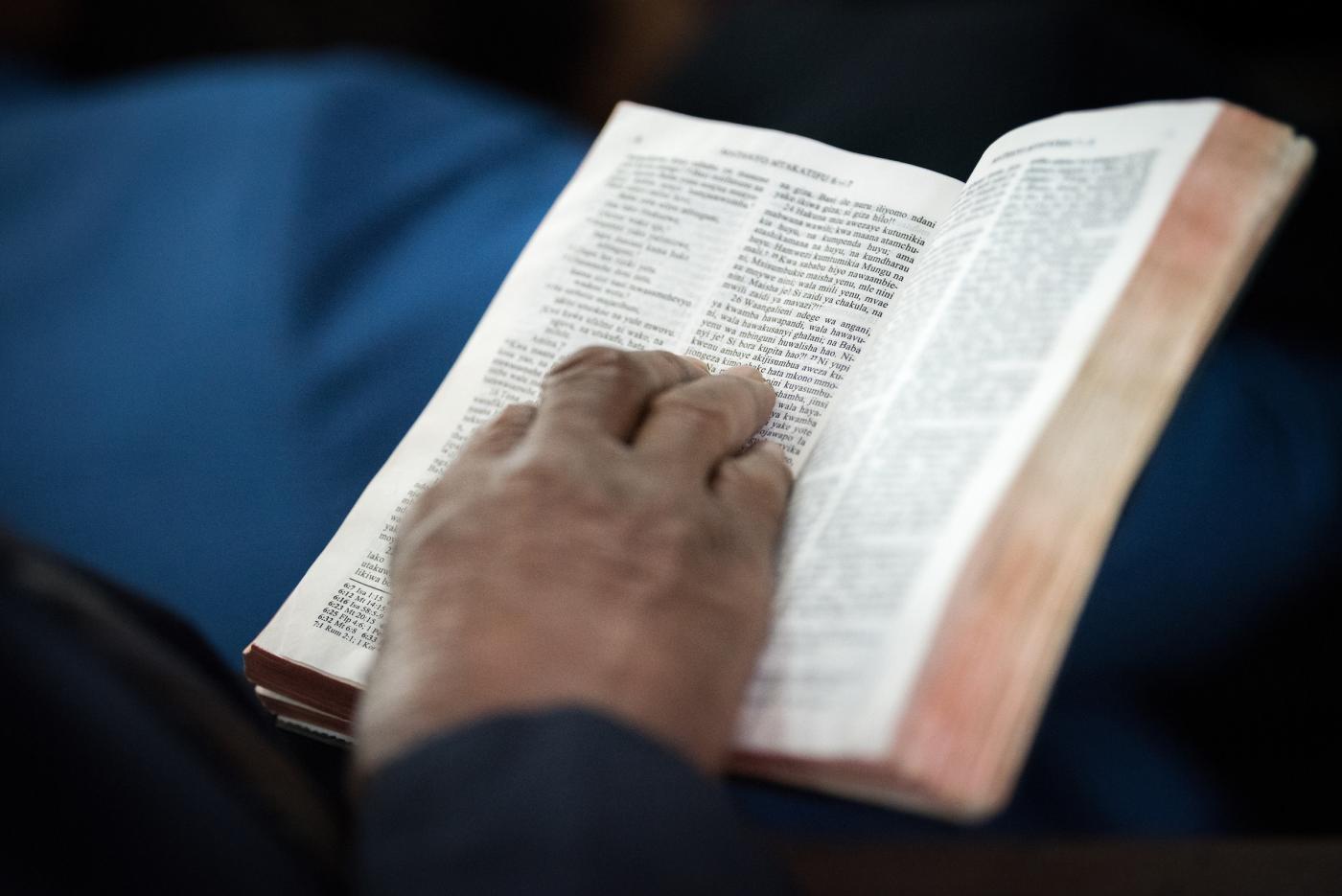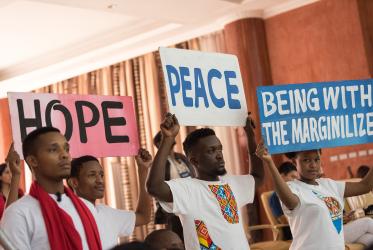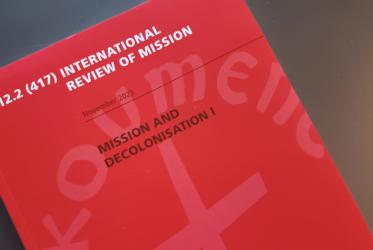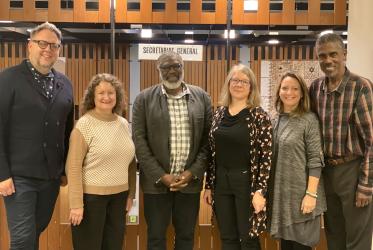CONVERTING DISCIPLESHIP: DISSIDENCE AND METANOIA
Study Paper produced by the CWME Working Group on Transforming Discipleship
Preface
The Transforming Discipleship Working Group of the Commission on World Mission and Evangelism (WCC) offers these reflections as an outworking of the Arusha call to discipleship. We are particularly mindful of the claim made in this Call that the ‘Holy Spirit continues to move at this time, and urgently calls us as Christian communities to respond with personal and communal conversion, and a transforming discipleship’. Discipleship has become a key issue across all levels of the Church, in our ecumenical work, our denominational work and our witness in communities. God seems to be challenging us to a more intentional commitment in response to His love revealed in Christ and the new world Christ embodies and invites amongst us now. Discipleship is key to effecting transformation in God’s body, the Earth and in Christ’s body, the Church.
Living in and leaving behind the colonially haunted Church …
Any truly ecumenical envisioning of Christian discipleship needs to take into account Christianity’s part in colonizing violence and occupation. The shift of the center of Christianity to the global South and to communities from the global South in the global North, means we are shaped by the currents and legacies of enslavement, colonization and power. The era of colonial empires and their missions may have passed but the systems, dis-order, attitudes and even some practices they created continue to dominate.
Mission, past and present, shows we have been creatures of love but also perpetrators of hate. Violence and hatred of people has been ‘baptized’ against those who don’t conform to ‘our’ norms, or those whose lands and lives become expedient for the growth and profit of colonial powers or indeed of the church itself. This has been done to the peoples of the earth, and also to the earth herself. This critique can be applied to churches and Christian agencies engaged in mission, but also it can be said for congregations in their local communities. This is a spirit and praxis in discipleship which needs to be exorcised and converted.
This is to critique Western colonial missionaries who used imperial expansion as a means to Christian expansion and in proclaiming Christ, rather asserted the ‘salvific’, ‘civilizing’ power of Whiteness and a White Christ. Mission is now understood to be from everywhere to everywhere. Missionaries are sent from all nations, especially the ‘global South’. But, many missionaries from the South are still in the ‘colonial’ mode perpetuating certain forms and norms of Christianity. The old ways of offering financial inducement, privilege in leadership, “love” dependent on conversion, promise of future blessing and the benefits of a superior faith and civilization are still the core evangelism tactics of these ‘new’ missionaries. In this way the discipleship paradigm of White Supremacy has morphed into ‘Christian Supremacy’ and ensured Christian discipleship and mission behaves as a colonial force.
The history and testimony of those churches who grew up in this era, remind us that the seeds of the Gospel planted by Western missionaries grew as a result of the nurturing work of indigenous hands, these were often the true agents of mission in the colonial era. In the face of colonial power, disciples of all nations, came forward who recognized in Jesus the one who could lead them, their people, their land, indeed the whole inhabited earth to liberation and peace. This reminds us that the Gospel has a power and a horizon which is greater than the limitations imposed by those who proclaim it. It has the power, like Jesus, to confound power.
Confounding Empire and its unloving and unlovely church
Luke 9 unmasks the ways disciples are tempted to violence. In a chapter focusing on the calling and meaning of discipleship, James and John, desire to destroy a Samaritan village which refuses to give them hospitality, (Luke 9:54). They expect Jesus to approve of this and sanction it, but instead He reproves them, tells them they don’t know what Spirit they are from, (Luke 9:55).
It is not hard for us to hear this judgement placed on we ‘James and Johns’ today. Some people of no faith and all faiths discern in the heart of churches not love, but hate. They conclude we belong to a different spirit to the one we claim, that we are moved not by the love of Christ but by phobias and prejudice, which far from inviting reconciliation and unity, create the conditions for violence and division. This is all the more troubling because there are wider political powers manipulating this and profiting from it.
But, yet the Spirit of Christ is moving. Amongst the disciples who follow James and John are those who are more like Mary and Martha, of whom we can see faithful, honorable and credible love. There are many in our movements and churches who embody the vision, wisdom and spirit Christ breathes on those He calls to be the means to forgiveness and liberation.
Christ is at work, meeting and making disciples amongst all kinds of places and peoples, so we have hope. The Spirit is active inside and outside church challenging us to become the people God calls us to be. Marginalized communities are claiming Jesus’s presence in the church for themselves, turning upside down the world and the church. Indigenous communities are reclaiming the epistemologies and spiritualities of their peoples, land and histories to release Jesus from this colonizing past. Immigrant church communities flourish with the hope and joy of the Gospel, in the face of racism and xenophobia. Peoples whose caste, ability, sexuality or gender make them targets of religious violence gather in communities which show they are beloved by God and responding to His love. Historic churches, declining in many places, are being renewed in life and spirit by migrant communities faithful to the call Jesus has placed on them for centuries. The margins are coming to renew the church as a sign of God’s mercy. This is Magnificat breaking out from below, showing where the Church is and should go.
Disciples in new relationship with God, each other, and the earth
Our confession invites a metanoia, a new orientation and direction. As we look to leave behind a colonial and chauvinistic church, we see the way open through a spirit of interculturality, marked by an ethos of open-ness, hospitality and vulnerability. Perhaps in this way the world might discover a church which is loving and lovely, like Christ.
Embracing the image of God in the other, embracing the earth as beloved by God will turn our world, churches and discipleship upside down. It will profoundly remodel us on Christ’s incarnation, who is the very embodiment of interculturality, by which creation and creator become revealed to each other in a spirit of love.
Interculturality gives us an ethos for living out an authentic repentance for the hurts and hatred to which we are party. Interculturality brings the oppressed and oppressor together in a way which realizes Jesus’s vision of the first being last, and Mary’s song of Magnificat in which the humble are uplifted, and all are released into the world of God’s radical grace. This means intentional action. It is not enough to be ‘not racist’, for example, we need to be anti-racist. It is not enough to lament the harm we do to the earth; we must live now in ways which bring her ease and healing.
A Biblical call into being the visible vulnerable body of Christ
Jesus’ incarnational - intercultural model lays aside power and privilege and promotes humility (Phil 2: 6-8). How can the ekklesia model this? Or do we think it does not apply to our bodies, powers and privileges? Having allied ourselves so deeply with Christendom and mission as the extension of Christendom, our conversion must be seen in resisting the Christendom temptation to want power and influence and impose one form of Christianity. This means we must name and know our history and make reparation for it.
As we look to be the Body of Christ after Christendom, we look the models of the church before Christendom. We can see dimensions in the early church communities we meet in Acts and the Epistles.
Disciples living distinctive lives in resilient communities: Acts 4: 32-33 shows us how the early Church lived under Empire. They found and shared in each other the spiritual and material resources to live out a world seen through the promise of the Magnificat.
Disciples defining life in God’s service as embodying love: Paul outlines to the Christian community at the very heart of Empire that their new life in Christ was centered on love. Romans 12: 9 - 20, advocates an empathetic spirituality to guide disciples in their work and witness. In these human ways a divine ethos is enacted.
Disciples who are citizens of the coming new world: We live under powers and principalities constantly discipling us into their values and purposes. Christian communities seek to live out the counter claim of their faith that Jesus is Lord and find in each other the counter community with Christ at its heart, not Caesar. Roman critics despised the early church because it was made up of the ‘dregs of society’, typically women, children and slaves. Ephesians 2:19-20 reminds communities made up of the hoi polloi that they are citizens of heaven. Disciples live at the margins of empire, signifying the borders into a new world, and thus cannot, in integrity, re-center themselves in the halls and heart of empire. In this way we can transform discipleship by decolonizing and de-centering it.
MOVING IN THE SPIRIT
Spirituality of dis(sident)cipleship
There is therefore the need for discipleship rooted in the Spirit of Jesus, not the spirits of the powers. This is to step forth in courage, living out a distinctive and authentic love, sounding a dissident note in the many beguiling and compelling melodies of empire.
The dynamics of discipleship
Called into personhood
Discipleship begins with the call of Jesus. This call is not into an existing ecclesial identity but into a new creation which is the realization of our humanness, (2 Cor 5:17). This is what is life-changing, especially for those who find their humanity denied or defined by dominant powers. This counter-identity forges a dignity in which we can stand against those who oppress.
Sent into new/counter peoplehood
As we respond to His call, Jesus sends us into new relationships with God, each other and the earth. What begins in the personal and private finds its fresh direction through the communal and public. Personhood gives way to peoplehood. Disciples are thus part of a movement seeking, through love, the power to transform the public and political realities of the world
Leaving behind the whitewashed tombs
Discipleship means leaving behind the systems and certainties which claimed us thus far. Stepping out of political and religious systems and disputing their dominant claims. Jesus’ call contests the prior calls of all religious and political power. Discipleship is a dissident act. As Jesus renews His disciples so we are to reform the living stones of our traditions.
Travelling companionably with those God sends
Jesus is not raising a conquering army. His is a movement of companions meeting Jesus all of a sudden on the road. Jesus comes to these pilgrims in many forms and moments. Especially in the bodies of those empires despise, (Matt: 25: 43) and in the moments which feel like defeat and despair, (Luke 24:13ff).
Embodying love and creating change
We are pilgrims living out the Psalms of ascent moving from despair (Ps 120:1) till we come through the night into a dawn of blessing in God’s presence, (Ps 134:1) This is made visible in the love we show and the change we invite in the face of injustice and wrong.
CHRIST’S LOVE MOVES THE WORLD TO RECONCILIATION AND UNITY
The love of Christ is Trinitarian as it is a reflection of the love that is shared among the three persons of the Holy Trinity. God is love in the triune form. This implies that only when love is shared it becomes divine and Christ-like. The Trinity's love that is characterized by perichoresis, is the basis of our love of God, love for one another and love for creation, a discipleship that is transforming. Christ is challenging us to a way of life, marked by love, John 13: 34-35. In a world that is increasingly being formed and conditioned by an overwhelming ideology and culture of fear of and hatred for the other, the theme invites us to radical action, to MOVE the world, move it upside down as the early disciples of Jesus did. Christ's Love compels (2Cor. 5:14) us to be radical. It urges us to take up the mission of reconciliation and unity ((Eph. 1:10; 5:18-19) seriously.
The kind of reconciliation and unity that Christ's Love challenges us with is not mere conciliation or shallow unity but a costly one. Christ's love, exemplified on the Cross, brought forth genuine reconciliation and unity by destroying the walls that were divisive and discriminatory (Eph. 2:14-15). In other words, it is the presence of justice that gives reconciliation and unity it's Christological content. The Word becoming flesh was Love expressing itself in justice. Mere love devoid of justice is not Christ's Love. Transforming Discipleship then is about translating the love of Christ into justice in a world that is marred by forces of injustice and hatred. A world that is moved (upside down) by the love of Christ would be a world of authentic unity and reconciliation, a just world, an expression of the reign of God.
The Triune God asserted sovereignty over Creation and history in the life, death, resurrection, and promised second coming of Jesus - as a baby, yet Ruler of all; as a crucified criminal, yet Ruler of all; as a single human being in a moment of time, yet the destiny of all the ages. This profound contradiction of the values and ideals of the rulers of this age, is the revealing power and pattern of our discipleship. In it, we not only see our way, in Creation and history, we also behold, as if in our peripheral vision, the trajectory of the Word of God - in the will of the Father and the power of the Spirit - in Creation and history.
Seen especially in his baptism, the mystery of the life, death, resurrection, and promised second coming of Jesus unveils the divine presence in Creation. This living reality, the active divine presence in every particle of Creation, reveals the sacramental reality of our Created life and, at the same moment, displays the way our humanity is unbreakably entwined with the life and health of all Creation. Our discipleship in Jesus, therefore, is found to be in a struggle with the materialistic reductionism of much modern thought, the partner of the ecologically abusive patterns of the globally metastasizing culture of money.
The singular expression of God in Jesus reveals sacrificial love to be the pattern of life in all Creation. It is not only a moment in salvation history, it is the unfolding of salvation history. As such, it is the pattern of life entrusted to us who have been born anew in baptism. As sacrificial love is the heart of Creation and the unique sign of the World to Come, lack of love, Jesus tells us, is the product and unique sign of a world of injustice and evil (Matthew 24:12). Our endurance in the face of the evil that captivates the rulers of this age is, above all else, the endurance of sacrificial love.
We should understand, then, that Jesus has chosen to assert His presence and sovereignty, in this time of waiting, in the margins of this age. Promising a special presence in the hungry, the thirsty, the stranger, the naked, the sick, and the prisoner, He says, if you wish to find me, you will find me there. It is there that He promises to meet us in a special way; it is there that the World to Come is born; it is there that our discipleship finds its true home.
God of justice and love:
Move us to reconciliation and unity!






